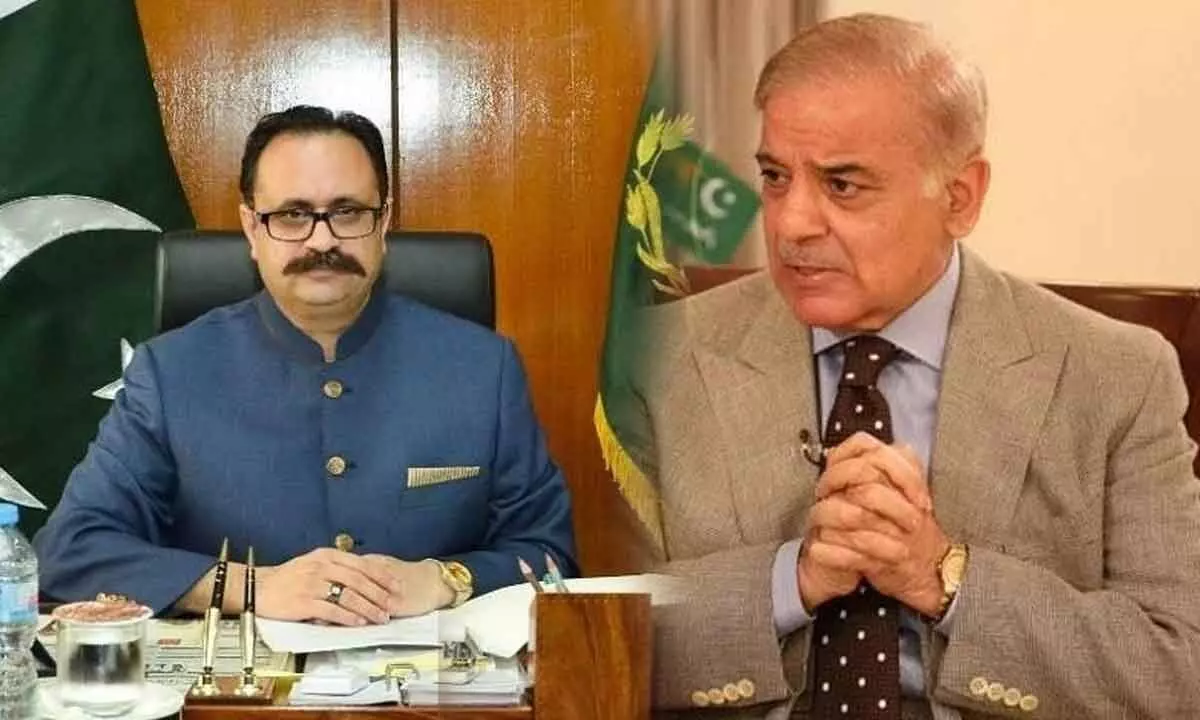Pak PM, PoJK premier get into verbal spat
PoJK people are living under the legacy of colonial oppression of Pakistan, says its premier Tanveer Ilyas
image for illustrative purpose

On Monday, Pakistan Prime Minister Shehbaz Sharif and Pakistan occupied Jammu & Kashmir (PoJK) premier Tanveer Ilyas got into a verbal spat in Mirpur at an event which was held to mark the completion of refurbishment of Units 5 and 6 of the Mangla Dam hydroelectric power plant.
Ilyas interrupted Sharif's speech complaining that the latter did not mention about the sacrifices of the people of Mirpur who had been displaced to give land for the construction of Mangla Dam in 1965.
After concluding his speech, Sharif left the venue in a hurry and when Ilyas tried to get close to him he was manhandled and pushed by the Pakistan Prime Minister's security personal.
This has led to widespread protests all over PoJK. During the early hours of morning on December 6 youth from Jammu & Kashmir Students Lives Matter (JKSLM) began to gather outside the Central Press club in Muzaffarabad.
At around 11 a.m., JKSLM students started raising slogans against Sharif demanding an apology for his 'colonial' behaviour.
By around 1 p.m. large crowds of civil society members as well as Pakistan Tehreek-e -Insaf workers arrived at the Central Press Club and set tires on fire. At about the same time protests of similar nature began to spread across PoJK.
Ilyas held a press conference in which he accused his Pakistani counterpart of being irritable and irrational claiming that Sharif "did not even put in a good word for the people of Mirpur who had submerged the graves of their near and dear ones twice for the construction and raising of Mangla dam instead of offering anything he made announcements for development projects in (Khyber Paktunkhwa."
This is not the first time that a head of state of PoJK has been snubbed of given a shut up call by a Pakistani head of state.
Sardar Ibrahim, the first president of PoJK, was also arrested in 1950s on charges of treason.
During the 1960s when the land in Mirpur was being marked for the construction of Mangla dam the then military dictator of Pakistan General Ayub Khan and PoJK president K.H. Khurshid surveyed Mirpur during a helicopter ride.
Khurshid asked General Ayub Khan if it was possible to shift the construction site away from Mirpur to save the most fertile land in the region.
Ayub Khan told the PoJK president to mind his own business.
Khurshid, who also happened to be the first elected head of state of PoJK, was later forced to resign through an engineered vote of no-confidence and on August 5, 1964 when his presidency came to an abrupt end.
Later he was arrested and sent to Dalai camp. He was stripped and kept naked for 15 days. Khurshid died in 1988 in a road accident. Another president of PoJK, Sardar Qayyum, was arrested in Kotli by the Bhutto government and kept in Planderi jail. He was charged with treason.
Chaudhary Noor Hussain, former president of PoJK and father of the current President Sultan Mahmood, was arrested and accused of writing a letter to India for help. Chaudhary Ghulam Abbas of the Muslim Conference, who was made the supreme head of PoJK in 1949, was also arrested at one point during the 1950s by Pakistan.
Hence, the treatment that PoJK's current prime minister has been given is nothing alien to the political history of the occupied territory. It is a manifestation of a cruel and ugly reality that confirms that my people are living under the legacy of colonial oppression of Pakistan.
The irony is that even after being treated like dirt the ruling classes of PoJK still try to win the favour of their occupier.
Therefore, even after the recent spate of insult that Ilyas has been awarded with, he still claims that Pakistan is dear to him than his own life.
Despite derogatory treatment being received from Pakistan from Khurshid to Ilyas all heads of states of PoJK were and remain loyal to the hateful jihadi ideology of Jinnah's two-nation theory.
The only social force that can help liberate PoJK from shame, humiliation and the continuous occupation of Pakistan is therefore the common people of the occupied land.
(The author is a human rights activist from Mirpur in PoJK. He currently lives in exile in the UK.)

